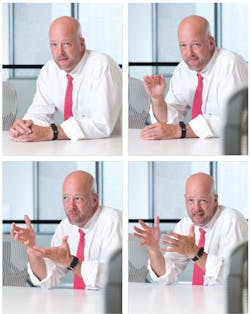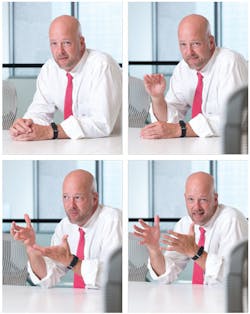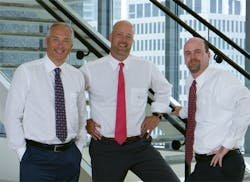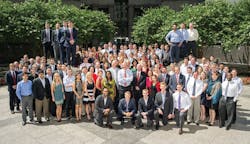TPH is in the advice business
With more than 160 employees, the advisory firm has grown tremendously
Photos by Sylvester Garza
EDITOR'S NOTE: Founded in 2007, Tudor, Pickering, Holt & Co. has grown from a boutique-sized investment bank into an integrated financial institution that specializes in energy investment and advisory services. Today, TPH has more than 160 employees with offices in Houston, New York, London, Calgary, and Denver. Maynard Holt is co-president of TPH and leads the firm's upstream advisory business. He also serves on the Editorial Advisory Board for OGFJ. We spoke with him recently at his offices in downtown Houston.
OIL & GAS FINANCIAL JOURNAL: It's always good to talk with you, Maynard. Can you tell our readers a little about your professional background and when you joined TPH?
MAYNARD HOLT: In its current form, including the banking franchise, the firm was established in February 2007, and I came on board in December of that year. Pickering Energy Partners dates all the way to 2004 though. That was the firm Dan created and that is now the securities division of TPH. Previously, I was a managing director with Goldman, Sachs & Co. where I worked in leveraged and structured finance and later in the energy, power, and natural resources group. Those 13 years at Goldman were great training for my role at TPH. I have a BA in Economics and Russian from Rice University and a masters in public policy from the John F. Kennedy School of Government at Harvard.
OGFJ: How big a part of your business is M&A advisory?
HOLT: It's a huge part of our business. It's our dominant flavor. We have a growing capital markets business, and have a very significant securities business, and our fastest-growing business is asset management. But the heart and soul of our company is M&A advisory, which is very close to saying that our main business is giving advice. Almost all our projects seem to begin with a client asking "what should we do?" We love those types of projects.
OGFJ: Is this going to be a good year for M&A?
HOLT: Yes. Very good. It's been solid for a long time now, although 2013 was kind of a digestion period for the upstream – a whoa-what-just-happened kind of year. But 2014 is extremely active. There's a lot of money available, and a lot of confident, determined people trying to make things happen. What I think gives this market very good direction and real strength is that if you're a public company, it's pretty clear how you should improve yourself. Public investors want fewer basins, more obvious growth, and fewer commitments. They want things leaner, tighter, and more focused. For the private companies looking to sell or go public, it's also pretty clear what kind of company you should build.
OGFJ: You advise on a lot of deals, and every deal requires due diligence on the part of the buyer and his representatives. Can you tell us a little about how this process works? Is it basically the same for a corporate acquisition as it would be for an asset transaction? How much time and effort are spent performing due diligence work?
HOLT: Our business has been about two-thirds sellside assignments and one-third buyside assignments. We are extremely selective about the kinds of buyside assignments we take on.....almost always they have involved a unique and or prominent buyer and frequently a high-profile or special target. Our due diligence team is pretty complete and we offer our clients a subsurface team that does its best to assess an asset's or a company's raw potential. We combine that with financial, commercial, and other skillsets to round out the effort. We like to think of ourselves as a business development effort for hire. In addition to the upstream, we bring oilfield service, midstream, and power professionals as needed. The firm is all energy, all the time, so we have a very deep bench of people, information, and experience to help our clients.
Public versus private, that can cut both ways, Don. In some ways, due diligence on a public company can be easier as much has already been done. But seeing through the public market valuation and developing a differentiated view requires a high degree of precision and insight. We like to think we can do that pretty well.
Left to right: Bobby Tudor, chairman and CEO of Tudor, Pickering, Holt & Co.; Maynard Holt, co-president and head of upstream investment banking; and Dan Pickering, co-president and head of TPH Asset Management.
OGFJ: The deal market seems slightly reminiscent of the real estate market – sometimes you want to buy a house but find yourself in a position bidding against other prospective buyers.
HOLT: Well, when you think about it, there are some parallels to bidding on a house. What's the one thing that makes you actually bid on a house? It's usually the fear that someone else is going to take it. That's why house sales happen pretty quickly...and if they don't, they can take a long time. If a house makes it past the first few weeks with no one buying it, it might sit for a while. I'm out of my league playing real estate here, but there is a similar dynamic in energy M&A. Any seller needs to have competition and there has to be a sense that it is a horse race, otherwise it's harder to achieve a favorable outcome for the seller.
OGFJ: How long does it take to complete a corporate acquisition, and is this a lot more complicated than an asset transaction?
HOLT: A corporate transaction and an asset transaction are very similar in a lot of ways, such as the basic valuation and analysis that has to be done. But when you layer on "corporate" to the asset component, you include everything related to structure and all the considerations of being a public entity, which are really sensitive and extensive. The social issues that come with buying a company versus buying an asset – who's going to do what, the integration issues and so forth – add an enormous layer of complexity. You're in effect buying a living entity. It can be much significantly more complicated than buying an asset. That's why most companies have a bit of a preference for assets. At a base level, I think the answer to your question is, in my experience, the corporate deal is going to be much more difficult to do.
OGFJ: Is it easier to buy a company whose assets are concentrated in one basin rather than one that might have scattered assets?
HOLT: Yes, it's much easier as there's just less due diligence to do. If you become a multi-asset company, multi-basin, or whatever, the probability that someone is going to come along and want all of that is lower. Anyone who buys that is going to have to sell some of the assets. Most buyers want to buy what they want – not what they don't want. I've seen attractive situations that came with additional assets that were less desirable. The buyer didn't want to acquire assets he would immediately have to sell. So these situations can be deal-breakers, but they shouldn't be. They clutter the seller's story, but if the buyer can see through that, he can probably make a better deal and pay less for the whole thing. He can do a little surgery and come out of it with a better transaction than if he had just bought only what he wanted. The irony is that the buyer will usually knowingly pay a little bit more to get only what he wants to avoid the hassle of acquiring assets he doesn't want.
became the world's most attractive place to invest,
there was a time in the late '90s when there were
a lot of places to go for production growth, but
the Lower 48 was not one of them. If you were going
to the deepwater, to offshore Africa, or to the
Middle East, it was better to be bigger. However,
right now, there just is not a sense that being bigger
is better. That clearly affects the mood around
corporate M&A. It means companies are drawn to
being bigger in their existing basins, but not necessarily
bigger overall."
OGFJ: Is being bigger better?
HOLT: Most of our clients today don't seem to think so. Would their story be easier to understand if they were bigger? No. Would their cost of capital be less? Probably not much. Would Wall Street reward them because they're bigger? No, that doesn't seem to be the case. Would they grow faster? No. Would more people be drawn to working there? Not clear. Would their decision-making suddenly be better? Bigger is not usually associated with faster internal processes, so probably not.
Now all that is in the context of executing in the Lower 48. There are obviously a lot of things a bigger company is better suited to doing. So we are in a phase where bigger isn't necessarily better.
There was a time, of course, when investors did attach more value to being bigger. Remember the concept of the super-independent? That was before the Lower 48 went on this great rally and became the world's most attractive place to invest. There was a time in the late ‘90s when there were a lot of places to go for production growth, but the Lower 48 was just not one of them. If you were going to the deepwater, to offshore Africa, or to the Middle East, it was better to be big. Right now, there just is not a sense that being bigger is better. When you factor that in, single-basin companies are more likely to be acquired than multi-basin companies. But there are exceptions to every generalization.
OGFJ: How do you determine the selling price of a company? Is there a formula that you start with and then go from there?
HOLT: For an upstream company, you go through various analytics and model the obvious potential. There are a lot of assumptions, and a huge number of combinations in which those assumptions can come true. You have to sort through all those factors and find a way to bracket all those potential outcomes. It can be daunting but it's exciting and always seems to have an interesting mix of science, estimation, and risk assessment.
What we have found is that the leadership of a company is incredibly important – who those people are, how they think, how they're motivated, who they've hired, how they empower people, and how they drive the culture in that company. It's all so crucial to a company's success. You can't find any of that in the models I just mentioned. So a lot of this value is just lost when you rely solely on asset analytics.
This is an area where I feel like we have been especially helpful to our clients. It's one thing to say the assets are worth this or that, but it's another thing to say, "I know these people. I feel really good about this team. I've watched how they performed with previous companies. This is the kind of thing that I myself would invest in." That type of valuation of a situation is really kind of PhD-level stuff.
The thing about these shale plays is they are incredibly cost sensitive and all the solutions are unique. The only way you can get one of them to work out is to have the people who are running the operation directly linked to the economics of the play. Otherwise, they're just not going to have that "how do we save a nickel" mentality that you need. And the other thing you have to have is that you have to let them make their own decisions. You can't impose standard ways of doing things on them – things like "Hey, this is the way we do it over here. You guys will be doing it this way." So you have to incentivize them and then let them make the choices regarding drilling and completions and everything else. My point is that these plays are so cost sensitive and there are so many things you have to tinker with to make them work, you just need to turn people loose and you have to have them directly linked to the economics of the play. That's probably just been easier to do so far in smaller companies.
TPH employees outside the company's offices in downtown Houston.
Photo by Ladd Photography
OGFJ: Are you working with any renewable energy companies at this time?
HOLT: In the early days of the firm, renewables got our attention a little more than they do now. We watch it, we think about it, for sure., and we're not going to let it sneak up on us, but right now, we're not involved in that sector. Natural gas ties in as a cleaner fuel, so maybe it's a bridge to renewables. But, as a firm, renewable energy doesn't yet offer us particularly attractive investment opportunities. For our investing clients, there aren't a lot of renewable stocks that are capturing a lot of attention. There are a lot of things that you need to be researching. We'll continue to keep a close eye on renewables, and we'll get involved when the time is right.
OGFJ: We're down to the final question. What would you like our readers to know about TPH that they may not already know?
HOLT: I think a lot of people might be surprised to know the size of our firm. We're 160 people, most of us here in Houston, but we're also in Denver, New York, Calgary, and London. So the firm continues to expand. Most people know that we have a large research footprint, but they may not know that we have 60-plus investment bankers. That's a really large energy investment banking operation. People also probably don't realize how international we've gotten. We spend a lot of time on things outside the Lower 48. We also have a fast-growing asset management business. But the basic formula hasn't changed.
I had a guy ask me last week: What does it take to be successful at your company? It's such a basic question, and I thought hard on it. But reflecting on everyone we've hired and everything we've done, the people who have loved TPH and that TPH has loved, are almost always the same – they are smart people, they are ambitious people, and they are also really nice people. That sounds so basic, but that's the calling card of the firm. We're in the advice business, and you can be a good advisor if you really hustle and if you're pretty smart – but being nice helps a ton, too. As we grow, we'll always keep this in mind.
OGFJ: Thanks for taking the time to talk with us today, Maynard.




